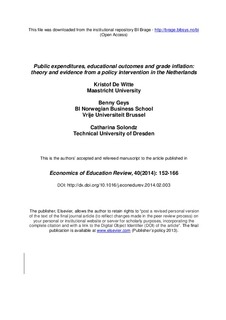| dc.contributor.author | De Witte, Kristof | |
| dc.contributor.author | Geys, Benny | |
| dc.contributor.author | Solondz, Catharina | |
| dc.date.accessioned | 2014-05-28T12:50:52Z | |
| dc.date.available | 2014-05-28T12:50:52Z | |
| dc.date.issued | 2014 | |
| dc.identifier.citation | Economics of Education Review, 40(2014): 152-166 | nb_NO |
| dc.identifier.issn | 1873-7382 | |
| dc.identifier.uri | http://hdl.handle.net/11250/195606 | |
| dc.description | This is the authors’ accepted and refereed manuscript to the article. Publisher's version is available at www.elsevier.com | nb_NO |
| dc.description.abstract | This article argues that resource expansion can fail to improve actual student performance because it might cause educators to soften grading standards (i.e., induce grade inflation). Our theoretical model shows that, depending on schools’ and students’ reactions to resource changes, the overall effect of resources on education outcomes is ambiguous. Schools, however, have an incentive to adjust their grading structure following resource shifts, such that grade inflation is likely to accompany resource-driven policies. Exploiting a quasi-experimental policy intervention in the Netherlands, we find that additional resources may indeed induce grade inflation, particularly when the resource increase is limited. | nb_NO |
| dc.language.iso | eng | nb_NO |
| dc.publisher | Elsevier | nb_NO |
| dc.subject | Public expenditures | nb_NO |
| dc.subject | Grade inflation | nb_NO |
| dc.subject | Educational attainment | nb_NO |
| dc.subject | Standardized central exam | nb_NO |
| dc.title | Public expenditures, educational outcomes and grade inflation: theory and evidence from a policy intervention in the Netherlands | nb_NO |
| dc.type | Journal article | nb_NO |
| dc.type | Peer reviewed | nb_NO |
| dc.source.pagenumber | 152-166 | nb_NO |
| dc.source.volume | 40 | nb_NO |
| dc.source.journal | Economics of Education Review | nb_NO |
| dc.identifier.doi | 10.1016/j.econedurev.2014.02.003 | |
| dc.description.localcode | 1, Forfatterversjon | nb_NO |
